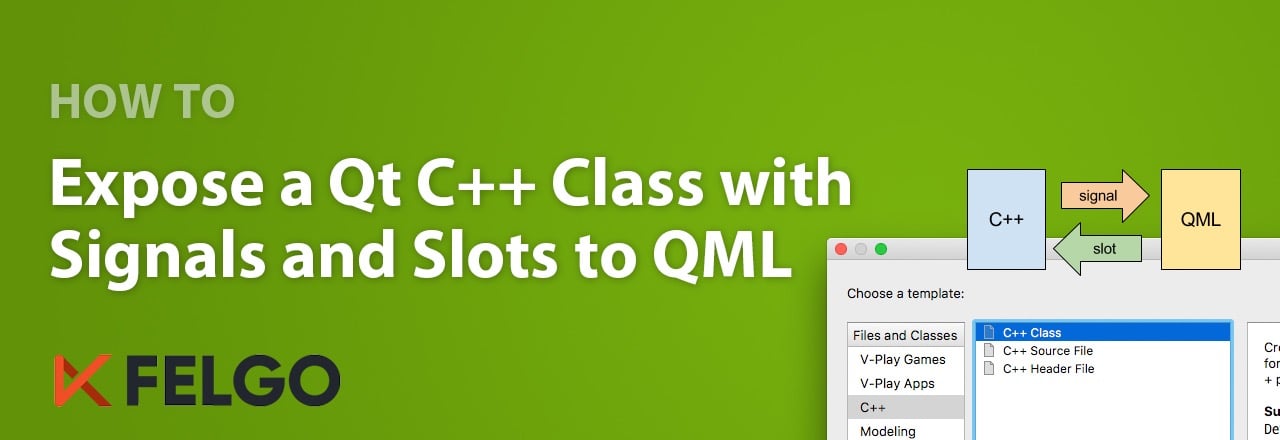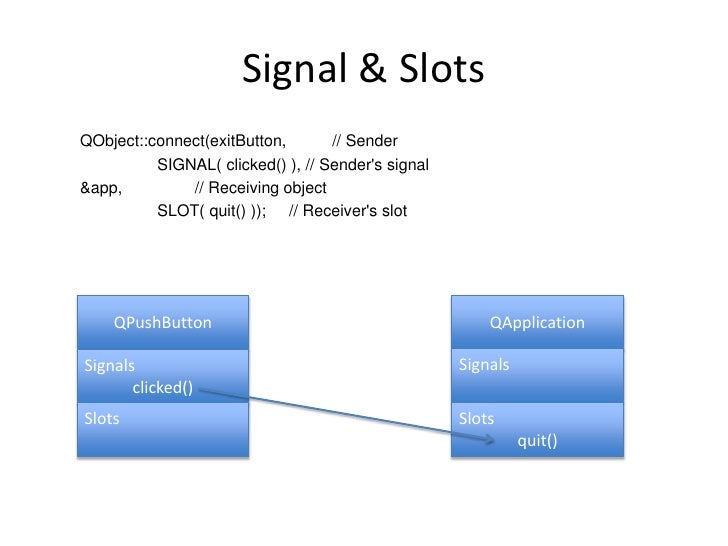Qt Slot Derived Class

So if you need to pass some complex information to a slot, create a class derived from QObject and use that. 1 Well, C does have some high-level constructs like boost::bind and the new C0x standard support for lambdas, but I don't believe either approach is formally supported by Qt's connect methods yet. QObject is the most basic class in Qt. Most of classes in Qt inherit from this class. QObject provides some very powerful capabilities like: object name: you can set a name, as a string, to an object and search for objects by names. Parenting system (described in the following section) signals and slots (described in the next chapter) event.

- Is there a different syntax to reference a base class's Qt signal? EDIT: The solution appeared in the comments to the question. I was confusing the Scene and the View. My Box2DView class is indeed derived from QGraphicsView, so the solution was to change the connection to reference view-scene for the signal.
- Support for QtCore.Signal, QtCore.Slot and QtCore.Property, including the creation of a dynamic QMetaObject. Features with wrapper generator. PythonQt offers the additional PythonQtQtAll library which wraps the complete Qt API, including all C classes and all non-slots on QObject derived classes. This offers the following features.
- There is an issue in PySide2/Qt5 when using signals derived from mixin. For example, the following code doesn't print 'emit2'. After calling mySignal.connect, mySlot is never called.
I’ve been using Qt for several years now in a couple different projects. Only today did I learn about QMetaObject::connectSlotsByName.
As the documentation states, this function will recursively search the given object for signals matching the format of:
If you’re using Qt Designer and MOC’ing, this fuction gets called automatically in your ui_<mainwindow>.h file inside of setupUi(). This means that you don’t have to manually connect the objects in your .ui files. I didn’t know this! You can simply do something like:

And that’s it! You don’t have to define the signals/slots in Designer, you don’t have to manually connect them (as I had been doing). Nothing! It just works!
I had never seen this mentioned in any tutorial or even code examples. I only stumbled upon it when looking at another project for something completely unrelated. But this is a great time saver!

The following are the built-in features of the PythonQt library:
- Access all slots, properties, children and registered enums of any QObject derived class from Python
- Connecting Qt Signals to Python functions (both from within Python and from C++)
- Easy wrapping of Python objects from C++ with smart, reference-counting PythonQtObjectPtr.
- Convenient conversions to/from QVariant for PythonQtObjectPtr.
- Wrapping of C++ objects (which are not derived from QObject) via PythonQtCppWrapperFactory
- Extending C++ and QObject derived classes with additional slots, static methods and constructors (see Decorators)
- StdOut/Err redirection to Qt signals instead of cout
- Interface for creating your own
importreplacement, so that Python scripts can be e.g. signed/verified before they are executed (PythonQtImportFileInterface) - Mapping of plain-old-datatypes and ALL QVariant types to and from Python
- Support for wrapping of user QVariant types which are registerd via QMetaType
- Support for Qt namespace (with all enumerators)
- All PythonQt wrapped objects support the dir() statement, so that you can see easily which attributes a QObject, CPP object or QVariant has
- No preprocessing/wrapping tool needs to be started, PythonQt can script any QObject without prior knowledge about it (except for the MetaObject information from the moc)
- Multiple inheritance for C++ objects (e.g. a QWidget is derived from QObject and QPaintDevice, PythonQt will automatically cast a QWidget to a QPaintDevice when needed)
- Polymorphic downcasting (if e.g. PythonQt sees a QEvent, it can downcast it depending on the type(), so the Python e.g. sees a QPaintEvent instead of a plain QEvent)
- Deriving C++ objects from Python and overwriting virtual method with a Python implementation (requires usage of wrapper generator or manual work!)
- Extensible handler for Python/C++ conversion of complex types, e.g. mapping of QVector<SomeObject> to/from a Python array
- Setting of dynamic QObject properties via setProperty(), dynamic properties can be accessed for reading and writing like normal Python attributes (but creating a new property needs to be done with setProperty(), to distinguish from normal Python attributes)
- Support for QtCore.Signal, QtCore.Slot and QtCore.Property, including the creation of a dynamic QMetaObject.

PythonQt offers the additional PythonQt_QtAll library which wraps the complete Qt API, including all C++ classes and all non-slots on QObject derived classes. This offers the following features:
- Complete Qt API wrapped and accessible
- The following modules are available as submodules of the PythonQt module:
- QtCore
- QtGui
- QtNetwork
- QtOpenGL
- QtSql
- QtSvg
- QtWebKit
- QtXml
- QtXmlPatterns
- QtMultimedia
- QtQml
- QtQuick
- Any Qt class that has virtual methods can be easily derived from Python and the virtual methods can be reimplemented in Python
- Polymorphic downcasting on QEvent, QGraphicsItem, QStyleOption, ...
- Multiple inheritance support (e.g., QGraphicsTextItem is a QObject and a QGraphicsItem, PythonQt will handle this well)
- QtQuick support is experimental and currently it is not possible to register new qml components from Python
PythonQt supports:
- Python 2 (>= Python 2.6)
- Python 3 (>= Python 3.3)
- Qt 4.x (Qt 4.7 and Qt 4.8 recommended)
- Qt 5.x (Tested with Qt 5.0, 5.3, 5.4 and 5.6)
The last working Qt4 version is available at svn branches/Qt4LastWorkingVersion or you can download the PythonQt 3.0 release. The current svn trunk no longer supports Qt4, since we started to make use of some Qt5-only features.
Qt Slot Derived Class C
- PythonQt is not as pythonic as PySide in many details (e.g. buffer protocol, pickling, translation support, ...) and it is mainly thought for embedding and intercommunication between Qt/Cpp and Python
- PythonQt offers properties as Python attributes, while PySide offers them as setter/getter methods (e.g. QWidget.width is a property in PythonQt and a method in PySide)
- PythonQt currently does not support instanceof checks for Qt classes, except for the exact match and derived Python classes
- QObject.emit to emit Qt signals from Python is not yet implemented but PythonQt allows to just emit a signal by calling it like a normal slot
- Ownership handling of objects is not as complete as in PySide and PySide, especially in situations where the ownership is not clearly passed to C++ on the C++ API.
- QStrings are always converted to unicode Python objects, QByteArray always stays a QByteArray and can be converted using QByteArray.data()
- Qt methods that take an extra 'bool* ok' parameter can be called passing PythonQt.BoolResult as parameter. In PySide, a tuple is returned instead.